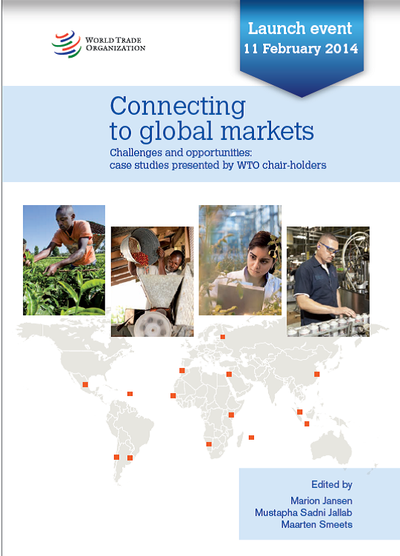5 Feb 2014
Connecting to Global Markets: Challenges and Opportunities
In recent decades, trade flows have become increasingly global, with developing countries and emerging economies playing an ever-expanding role. However, these countries, and particularly the poorest among them, continue to face a number of constraints in connecting to global markets.
The World Trade Organization (WTO) invited the members of its academic network in developing countries – the WTO Academic Chairs Programme – to identify major challenges in their respective countries and suggest ways to overcome them. The Chair holders during 2011-13 included the University of Chile – a project partner of the WTI within the academic cooperation project sponsored by the Swiss State Secretariat for Economic Affairs (SECO).
The resulting contributions were compiled into a volume, “Connecting to Global Markets”, to be launched at a meeting of the WTO Academic Chairs Programme in Geneva on 11-12 February 2014.
The volume is divided into four sections, focusing in turn on export diversification, the role of non-tariff measures, the rule of law in connecting to global markets as well as the role of the Aid for Trade initiative in building trade capacity and overcoming supply side constraints. The contributions provide powerful arguments in support of using trade policy instruments as an engine for growth and offer valuable insights into how developing countries can increasingly integrate into the multilateral trading system, according to the WTO.
WTI’s Director of External Programmes and Academic Partnerships, Pierre Sauvé, has served on the Advisory Board of the WTO Chairs Programme since 2010 and continues in that capacity as the WTO prepares to select a new crop of Chair holders, three of which are Seco project partners – PUCP in Peru, FTU in Vietnam and UPH in Indonesia.
“The fact that four of our five Seco project partners are involved in one way or another in the WTO Academic Chair’s programme shows how the Seco academic cooperation project carried implemented by the WTI has helped to raise the academic profile of our project partners and made them strong contenders for global recognition by the WTO,” commented Sauvé.
Further info
Book flyer
Book launch programme


